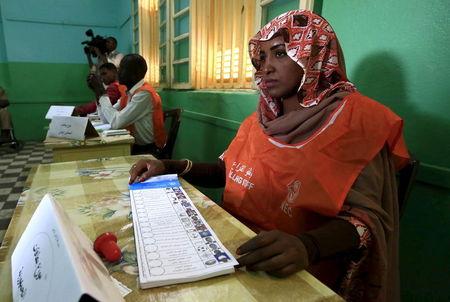Advertisement
Sudan's youth activists battle restraints and apathy
KHARTOUM (Reuters) - When the Arab Spring uprisings burst out four years ago, Bedreldin Mohamed believed that, finally, many of his Sudanese countrymen would join him in calling for an alternative to President Omar Hassan al-Bashir, now in his 25th year in power.
But this week, with national elections looking likely to re-elect Bashir after security forces cracked down on protest movements, opposition parties and the media, the 25-year-old activist's optimism has faded.
"After the peace with the south in 2005, and throughout the Arab Spring, we could make speeches outdoors and meet on campus," he said. "Now we're meeting in the dark or at home. Things have changed."
Most of Sudan's main opposition parties boycotted the presidential and parliamentary elections held on April 13-16, saying the government had continued to detain and harass them despite Bashir's promises last year to allow more political freedoms.
At least two presidential candidates pulled out citing irregularities in polling.
As a result, say government critics, voters have been left with few viable alternatives to Bashir and his National Congress Party.
The public's will to vote is also being worn down by government warnings that the country could fall into chaos under new leadership, activists say. The government is fighting insurgencies in the western territory of Darfur and along the border with South Sudan.
Mohamed's group "Girifna" (We Are Fed Up) has lost members, partly because "the government has planted this idea in people's minds that if Bashir leaves, or if we take a single step towards democracy, the country will fall apart," said 25-year-old member Salah Ahmed.
Over late night sweet tea and cigarettes on the banks of the River Nile in Khartoum, other youth activists who have known no other president but Bashir discuss how stricter controls on media and the opposition ahead of the elections forced them to adapt.
Considering it too dangerous to hold as many public speeches, they have sprayed graffiti and distributed pamphlets late at night calling on Sudanese to "Boycott the Blood Elections."
"HARD BUT PEACEFUL"
In the immediate aftermath of the wave of demonstrations and protests across the Arab world, Sudan managed to avoid major uprisings despite cuts in fuel subsidies that triggered demonstrations in 2012 and 2013.
Security forces clamped down on the disparate protest movement, which gradually faded away. The orange rubber wristband in support of Girifna is now barely seen on college campuses in a country where more than 60 percent of people are under 24.
But Ahmed says his group still wants to show people that Sudan's high inflation and unemployment are because of government policies.
"Then we can get them onto the streets," he said.
However just getting the country's 13 million eligible voters to the ballot box has been difficult: The head of an African Union monitoring mission said on Thursday the country's election turnout was between 30 and 35 percent.
Results are not expected until later this month.
Activists say the low turnout shows voters felt they had no real choice. But many voters said they preferred stability to the possibility of the violence that has hit Egypt, Yemen and Syria.
"Why should we protest? We've had demonstrations before and they brought us nothing," 35-year-old pharmacist Amna Hassan said at a bus stop in Omdurman city, across the river from Khartoum. "Our situation is hard now but it's peaceful. We don't want an Arab Spring here."



















Add new comment